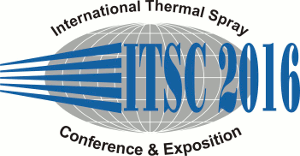
|
4746 |
|
Wednesday, May 11, 2016, Yellow River Hall 2:00 PM Aviation Industry II |
|
Effects of substrate roughness and spray angle on deposition behavior of cold sprayed inconel 718 for repair of aero engine components |
|
Reeti Singh* / Forschungszentrum Jülich GmbH, Germany Karl-Heinz Rauwald/ Institute of Energy and Climate Research (IEK-1), Forschungszentrum-Juelich, 52428-Juelich, Germany, Germany Georg Mauer/ Institute of Energy and Climate Research (IEK-1), Forschungszentrum-Juelich, 52428-Juelich, Germany, Germany Susanne Schruefer/ Rolls-Royce Deutschland Ltd & Co KG, Eschenweg 11, Dahlewitz, D-15827 Blankenfelde-Mahlow, Germany, Germany Alexander Barth/ Oerlikon Metco AG, Wohlen, Rigackerstrasse 16, 5610 Wohlen AG, Switzerland, Switzerland Scott Wilson/ Oerlikon Metco AG, Wohlen, Rigackerstrasse 16, 5610 Wohlen AG, Switzerland, Switzerland Robert Vaßen/ Institute of Energy and Climate Research (IEK-1), Forschungszentrum-Juelich, 52428-Juelich, Germany, Germany |
|
In this study, Inconel 718 powder particles were successfully cold-sprayed on Inconel 718 substrate by using nitrogen gas for an application to repair of aero engine components. Effect of substrate roughness and spray angle on the deposition behavior of Inconel 718 particles were investigated experimentally. Resulting microstructures and corresponding mechanical properties were studied. It has been found that the substrate surface roughness is limited to influence the deposition efficiency of only first few layers of deposited material. The SEM observation showed that substrate surface roughness has no significant effect on the microstructure of the coating but it does influence the bonding strength. Furthermore, the residual stress state of the coatings was significantly higher in case of smoother substrate surface, which increases with decreasing spray distance. It clearly indicates that deformation behavior is highly influenced by substrate surface roughness. Besides, it is also observed that particle deformation and coating quality are significantly affected by spray angle because of localized deformation at predominantly one side of the particle due to additional tangential momentum. Moreover, it is observed that both microstructural and mechanical properties are highly influenced by spray angle. |